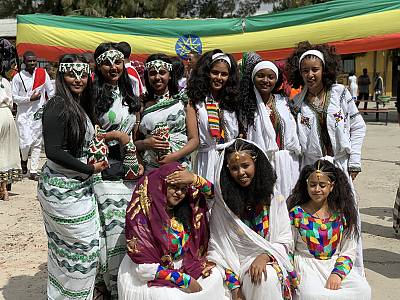Festivals in Ethiopia are typically colorful and exciting. The country has cultural, religious, and other festivals that can attract foreign tourists and local participants to come and gather to watch the procession and take part. The most known name of which held every year in Amhara and Tigray States is Shadey, Ashendye, Solel, Mariya, which is the name for a tall grass that young women usually tie around their gowns as a type of decoration. The celebration days also herald the freedom of young women. It is a popular festival which reverberates the voice of young women loudly.
Culturally, Ashendiye is celebrated in households with baking special bread (mulmul) and a small bonfire organized at individual residence or community in the neighborhoods. Children or Kids go house to house chanting “Bhunena Buhebelu.” The household gives either mulumul or bread or coins.
During this festivity, girls and young women attend the festival gathering together by dressing traditional attire. The whole community and government officials take part or attend the festival. People considered the celebration as respect given for females especially girls and women throughout the year. It is also considered as the value of declaring gender equality.
Before the celebration begins thousands of people march to the areas that host the festivity. Now, the festival has been attracting many local and foreign tourists. In both states, the festival is celebrated across certain districts. For instance, Ashenda is celebrated colorfully in Tigray State while Shadey in Wag Humra, Ashendiye, and Solel in Lalibela and Kobo respectively took place colorfully in North East Amhara.
The occasion usually takes place between August to September with traditional dressing, cultural costumes, and dances. As to documents, such kinds of festivals enable the world to increase and consolidate efforts at combating child marriage and gender-based violence. It develops the confidence of girls and young women. As part of their cultural celebration, the girls and women gather together in a central place where they divide themselves into smaller groups before going house to house to sing, dance, and entertain the people of their community. The festival makes people feel warm in a cold season.
Moreover, Buhe, Irrechaa, Ashenda /Shadey/ Sollel/Ashendiye are among the remarkable centuries-old cultural festivals celebrated colorfully across the country. In the northern part of the country, women’s festivals stand shoulder high in enticing the attention of both local and foreign tourists.
Recently, the government has announced that the festival will be marked at home due to the risk of COVID-19. Thus, government officials and religious leaders are calling on the public to stay at home and celebrate ceremonies keeping social distancing with limited participants.
Source: https://allafrica.com/stories/202008130761.html
The designations employed and the presentation in the texts and documents referenced in this platform do not imply the expression of any opinion whatsoever on the part of UNESCO concerning the legal status of any country, territory, city or area or of its authorities or concerning the delimitation of its frontiers or boundaries.
